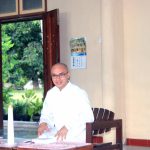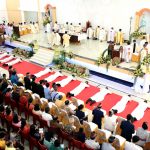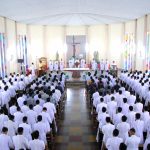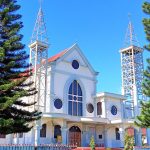Aventures missionaire – Indonesia
Philosophy temple in the service of the Church
Publié le 24/10/2023
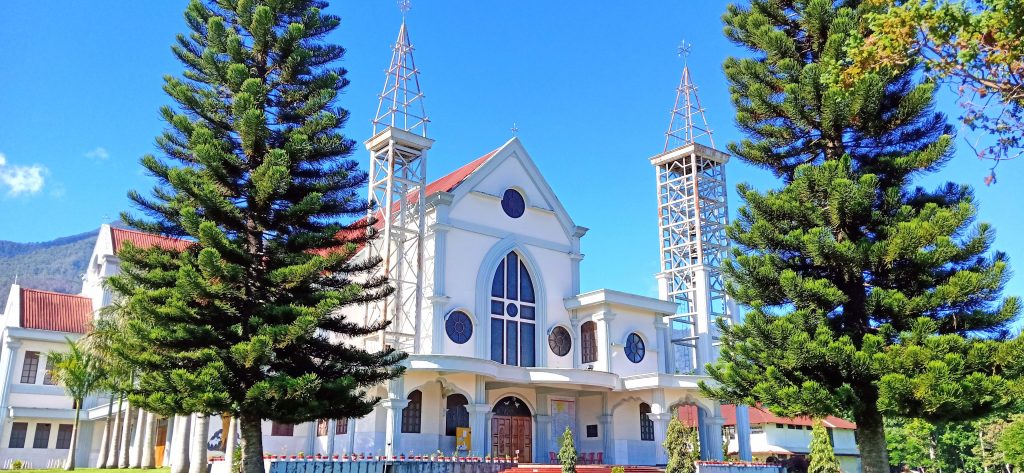
La cathédrale ddu docèse de Ruteng, plus grand diocède d’Indonésie
During its fiftieth anniversary celebrations in 2019, the school of philosophy announced that it had trained 19 bishops, 1,822 priests and 3,978 lay people, figures that exceed those of any competitors in Asia and around the world. Flores is a separate Catholic island in the Indonesian archipelago. A special island which, unusually, experiences little tension with other religions, particularly Islam. Which is not the case for Java or Sumatra. Like all the priests of Flores, who are born in a very Catholic environment, we have little experience of meeting Muslims. Immersed in a Christian world, with a father who was responsible for the village’s Christian community, I would often see the parish priest in our house. On his advice, in
2002, I entered the Pius XII minor seminary. It was only when I began my training that I met the Muslim community. Our trainers had created a programme of visits to Muslim homes during the Eid holidays. In 2008, I started on the foundation year and, a year later, I began my studies in philosophy at the Ledalero Catholic School of Philosophy, as a seminarian, for the diocese of Ruteng, my home diocese. I finished my philosophy studies in 2013 and started a pastoral year in the parish of St Thomas More, which continued until 2015. It was then that I discovered the linked but contradictory pastoral problems facing the Church: poverty and ecology.
Here is a sorry example of a moral dilemma: near the parish church there was a manganese mining company that needed workers. This business offered parishioners good salaries. However, for ecological reasons, the Church was opposed to this company and encouraged people to stop working there. Those who refuse to quit their jobs reject the calls of the Church. Finally, in 2014, the Diocese of Ruteng managed to organize a large protest which resulted in the closure of the business. While the ecological problem has been partially resolved by this action, poverty remains a major problem in my diocese, as in other dioceses of Flores. At the end of my pastoral year, I began my theological training in the same school, which offers a theological model based on the contextual situation, i.e. poverty, while the major seminaries of Java and Sumatra emphasise dialogue with Islam.
On June 18, 2017, I was ordained a deacon, and then a few months later, on October 4, I was ordained a priest. My first mission was to become a trainer at the Pius XII seminary, my alma mater. At the beginning of 2022, I began my second mission, in France, as a student priest. I study patristic theology. I received this mission following a request from my bishop, and thanks to the help of MEPs. This student experience in Paris has allowed me to better understand the missionary spirit of the Foreign Missions. I am also learning about Europe and its culture. A fitting return to the sources of the authentic teachings of the Church that I learned when I was a seminarian.
Christian buildings
Christianity in Indonesia also depends on the construction of buildings for Indonesian Christians. Thirty-seven cathedrals have been built in Indonesia, which is a considerable number in a predominantly Muslim country. Indonesia also has a significant number of shrines that are places of pilgrimage, such as the Velangkanni Church in Medan, the Sacred Heart Temple in Yogyakarta, and the Palinggih Ida Kaniyaka Maria shrine in Bali. These sanctuaries are very popular for Catholics and, in fact, all Indonesians, who often travel from far away. The holy shrine of Mary, in Bali, attracts as many Catholics as Hindus.
Yohanes Patrisius Suryadi, MEP student priest
- P. Yohanes Patrisius Suryadi, prêtre-étudiant MEP envoyé par le diocèse de Ruteng Indonésie
- L’ordination des nouveaux diacres 2023 au séminaire de saint Pierre Ritapiret, Indonésie
- La messe dominicale au séminaire interdiocésainde Saint Pierre Ritapiret
- La cathédrale ddu docèse de Ruteng, plus grand diocède d’Indonésie
